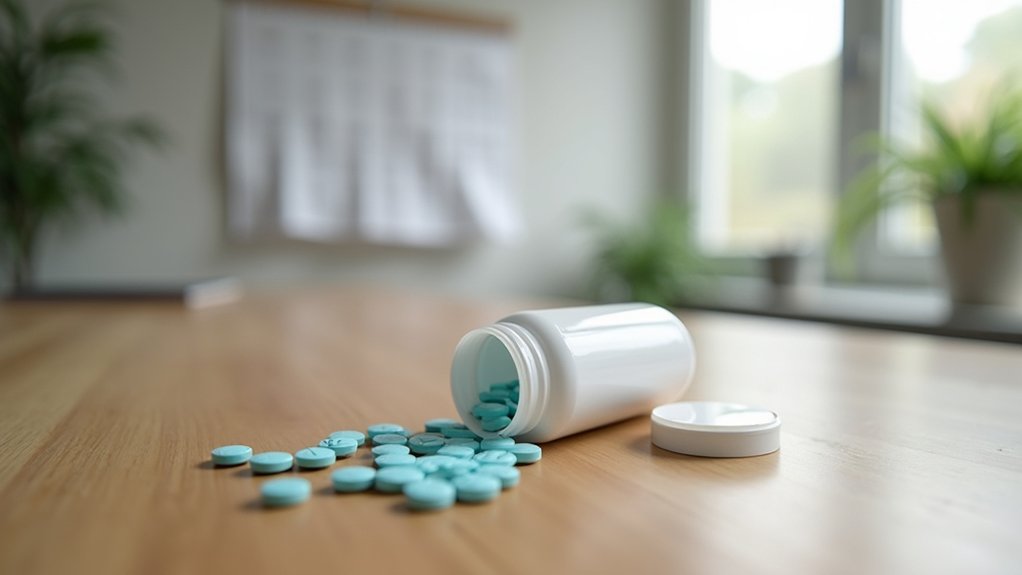Recovery unfolds through five key stages that guide your journey from addiction to wellness. You’ll first move from denial to acknowledging the problem, then build motivation and set meaningful goals. Next, you’ll take action through formal treatment programs, followed by sustaining sobriety while preventing relapse through support systems and coping strategies. Finally, you’ll achieve long-term growth by integrating holistic healthcare and continuing personal development. Understanding each stage’s unique challenges and opportunities can greatly improve your chances of lasting success.
Recognizing the Problem: From Denial to Awareness

When addiction first takes hold, your mind naturally builds protective barriers that shield you from recognizing the growing problem. You’ll likely minimize consequences, rationalize substance use, or dismiss others’ concerns as unnecessary interference. This denial stems from fear, shame, and the stigma surrounding addiction.
Eventually, repeated negative outcomes, health crises, relationship breakdowns, or legal troubles make the reality harder to ignore. You begin questioning established beliefs about your control, experiencing uncomfortable internal conflict as you weigh substances’ benefits against mounting consequences. Sometimes external events like job loss or family interventions can serve as catalysts that help plant the seed of recognition for your need to change.
This shift represents pivotal progress in reframing self perception from “I don’t have a problem” to acknowledging addiction’s presence. Without addressing denial directly, you face increased relapse risk even after entering treatment programs. The path to this realization varies significantly depending on the substance and severity of your particular addiction. Overcoming emotional barriers requires supportive relationships and nonjudgmental conversations that help you move past ambivalence toward accepting change.
Building Motivation and Planning for Change
Acknowledging addiction’s presence creates an opening, but lasting change requires you to cultivate genuine motivation that comes from within. Connect with your core values and life goals, this exploration fuels sustainable motivation for recovery. Reflect on addiction’s consequences to strengthen your readiness for action.
Personal goal setting provides essential direction and commitment. Break large objectives into specific, manageable steps to prevent overwhelm. Write down your goals to improve accountability and track achievements. Since motivation naturally fluctuates, build robust support networks through peer groups, family involvement, and professional guidance. Sharing your goals reduces isolation while increasing adherence.
Embracing small wins proves vital for maintaining momentum. Celebrate each milestone to boost confidence and reinforce progress. When you express willingness to try, the focus shifts toward developing a concrete action plan through collaborative discussion. Building inner strength through resilience practices helps you adapt to challenges and maintain flexibility when obstacles arise. Remember, your belief in your ability to change directly impacts success, so nurture self-efficacy alongside motivation.
Taking Action Through Treatment and Early Recovery

Moving from motivation into concrete action marks a pivotal shift where you’ll engage with formal treatment options and begin reshaping your daily life. This stage involves medical stabilization, addressing co-occurring disorders, and enhancing coping skills through evidence-based therapies like cognitive-behavioral therapy and motivational interviewing.
Key components of taking action include:
- Starting formal treatment – Whether through detox, inpatient, or outpatient programs, longer duration treatments (90+ days) show higher success rates than short-term interventions. Effective treatment requires tailored approaches that combine medication and behavioral therapy based on individual needs and circumstances.
- Building recovery supports – Connecting with peer support groups, family therapy, and community resources greatly predicts recovery maintenance and reduces dropout rates. Research shows that most people who successfully resolve addiction problems make a median of 2 serious recovery attempts before achieving lasting remission. Over 54.1% achieved recovery without any formal treatment, demonstrating the power of peer support and self-help approaches.
- Managing withdrawal safely – Medical supervision during detox, especially for alcohol and opioids, guarantees safe passage through acute withdrawal phases lasting several days to weeks.
Sustaining Sobriety and Preventing Relapse
After establishing your foundation in treatment, sustaining long-term sobriety requires developing detailed strategies that address the ongoing challenges of recovery. Building support systems becomes essential, engage regularly with peer support groups like AA or NA, maintain connections with sober friends, and avoid negative influences who threaten your progress.
You’ll need extensive trigger identification, ranking them by intensity to create personalized coping strategies. Develop skills like mindfulness, exercise, journaling, and breathing techniques to manage stress and cravings effectively.
Create structured daily routines that reduce idle time and reinforce healthy habits through consistent sleep, nutrition, and self-care. Managing high risk situations requires clear avoidance plans and immediate action strategies, whether contacting support, engaging alternative activities, or removing yourself from triggering environments entirely. Remember that early recovery is the most vulnerable period, with approximately half of individuals experiencing relapse within three months of detoxification.
Achieving Long-Term Growth and Wellness

While maintaining sobriety forms the bedrock of recovery, true healing extends far beyond simply avoiding substances. Achieving long-term growth and wellness requires an all-encompassing approach that nurtures your physical, mental, and social well-being over many years.
Your journey toward sustained wellness involves several key components:
- Holistic healthcare integration – Regular primary care visits increase sustained remission rates over nine years, while addressing co-occurring psychiatric and medical conditions improves long-term outcomes. Participants receiving yearly primary care visits show a 39% higher chance of achieving remission compared to those without regular medical support.
- Peer support systems – With 2.1 million people participating in recovery-focused self-help groups, these connections provide accountability and belonging that strengthen your recovery foundation. Given that 107,941 drug overdose deaths occurred in the U.S. in 2022, these support networks become even more critical for preventing relapse and saving lives.
- Continued personal development – Skill-building, education, and mindfulness practices enhance resilience and life satisfaction, supporting your ongoing transformation beyond addiction. Research shows that mindfulness-based interventions are associated with significant reductions in substance use, making these practices valuable tools for sustained recovery.
Frequently Asked Questions
How Long Does Each Stage of Addiction Recovery Typically Last?
The average timeline of recovery stages varies substantially based on your individual circumstances. You’ll typically spend weeks to months in awareness and contemplation phases before taking action. Detox lasts 3-10 days, while early recovery spans 1-3 months in treatment programs. Common timelines for recovery stages show maintenance requires months to years of ongoing effort. Remember, recovery’s a lifelong journey, there’s no universal timeline, and your pace is valid.
Can Someone Skip Stages or Go Through Them Out of Order?
Yes, skipping stages or going through them out of order is possible. Your progression through recovery stages is often nonlinear, especially during crisis situations like overdoses or legal consequences that propel you directly into action. You might bypass contemplation due to emergency interventions or external pressures. Research shows 40-60% relapse rates, demonstrating this cyclical nature. While stage-skipping can happen, missing preparation or contemplation phases may increase your relapse risk and require additional therapeutic support.
What Are the Most Common Triggers That Cause People to Relapse?
The most common relapse triggers you’ll face include stressful life events, negative emotions like anger or sadness, and exposure to former drug-using environments. Social situations involving substances, untreated mental health conditions, and lack of ongoing support drastically increase your risk. Effective cravings management and stress management techniques are essential for traversing these challenges. You’re particularly vulnerable when you discontinue aftercare services or lose your sober support network during recovery.
How Do Family Members Know Which Recovery Stage Their Loved One Is In?
You can identify your loved one’s recovery stage by observing their behaviors and attitudes toward treatment. Communication challenges often signal pre-contemplation, while research discussions indicate preparation. Active treatment participation shows the action stage. Look for support group involvement and sustained abstinence in maintenance. Don’t rely solely on their words, watch for consistent actions like attending meetings, avoiding triggers, and implementing coping strategies. Their willingness to discuss recovery openly also indicates progress.
Are There Different Recovery Stages for Different Types of Addiction?
Recovery stages follow similar frameworks across addiction types, but you’ll notice key differences in treatment approaches. Opioid and alcohol addictions often require medical detox and inpatient treatment, while behavioral addictions typically use outpatient settings. Substance addictions may involve medication assisted recovery like methadone or naltrexone, whereas behavioral addictions focus on cognitive-behavioral therapy. Your loved one’s specific addiction type, severity, and co-occurring mental health conditions will determine their ideal recovery pathway and stage progression.





